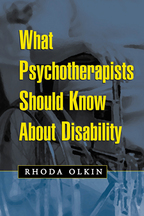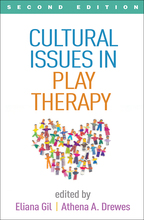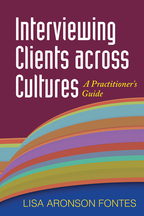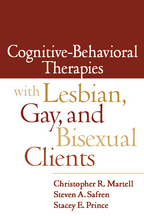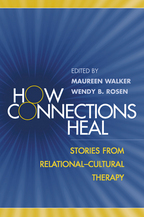What Psychotherapists Should Know About Disability
Rhoda Olkin
Paperbacke-bookprint + e-book
Paperback
orderJanuary 5, 2001
ISBN 9781572306431
Price: $58.00368 Pages
Size: 6" x 9"
Copyright Date: 1999
This book is available in alternate formats for people with disabilities. Contact Guilford Customer Service for details.
“A refreshing addition to a body of literature which usually lacks any alternative to the medical model....A very useful resource for teaching alternative ways to perceive disability.”

—Review of Disability Studies
“A valuable, insider's view of being on the outside....In addition to educating us about the social stigma these clients face, [this book] is full of practical resources and recommendations.”

—Networker
“Dr. Olkin is able, because of her own experience with disability and because of her experience through her work with people with disabilities, to set the story straight and to expose the myths and fallacies that have existed for centuries.”

—Disability Studies Quarterly
“Simply put, this is the best book on psychotherapy I've read in years. It is not only a superb guide to treating clients with disabilities; it is also an eloquent reminder of what systems-oriented therapy at its most creative can actually be. More broadly, Olkin opens us up to a compelling vision of how clinicians, teachers, and researchers can play an active role in ushering in a more just and diversity-valuing society.”

—Morris Taggart, PhD, Psychologist and Family Therapist
“This book is destined to become a classic. It is by far the most comprehensive and well-written text on the topic. Psychologists, social workers, educators, human resource specialists, and employers will find much of value. Olkin not only does a masterful job of integrating theory, research, and practice; she also communicates the human dimensions of disability. She speaks passionately and forcefully, providing personal insights that help readers understand the experiential reality of disability. This book is helping me to confront biases, stereotypes, and discomfort that may obstruct my interactions with students, clients, and acquaintances with disabilities. I am confident that it will make me a more effective clinician. This is a 'must read' for helping professionals and educators.”

—Derald Wing Sue, PhD, President, Society for the Psychological Study of Ethnic Minority Issues, Division 45 of the American Psychological Association
“Olkin has produced a comprehensive and penetrating analysis of the significant issues that impact upon the lives of people with disabilities. Organized, concise chapters address dating and romance, sexuality, advocacy, discrimination and stress, treatment and pain, and a plethora of other significant topics. The bibliography is outstanding. This book is not just for psychotherapists—it is a vital resource for anyone who studies disability or is involved in the care or treatment of people with disabilities.”

—Mark Nagler, PhD, Professor of Sociology and Disability Studies, Department of Sociology, Renison College, University of Waterloo, Canada
“This book is a groundbreaking bridge between the disability community and the mental health profession. A comprehensive and practical resource containing a thorough review of the literature, it is replete with original analyses and illustrative clinical vignettes. Olkin's humor, honesty, and sharing of personal disability experience make this an absorbing work. It will inform mental health trainees and will be of interest to practitioners and researchers, whether or not they have disability expertise.”

—Megan Kirshbaum, PhD, Executive Director, Through the Looking Glass; Co-Director, National Resource Center for Parents with Disabilities, Berkeley, California
“Counseling students can greatly benefit from learning more about working with people with disabilities. I try to integrate this topic in every course I teach.”

—Susan H. Packard, Graduate Education-Counseling Department, Gwynedd-Mercy College
—Review of Disability Studies
“A valuable, insider's view of being on the outside....In addition to educating us about the social stigma these clients face, [this book] is full of practical resources and recommendations.”
—Networker
“Dr. Olkin is able, because of her own experience with disability and because of her experience through her work with people with disabilities, to set the story straight and to expose the myths and fallacies that have existed for centuries.”
—Disability Studies Quarterly
“Simply put, this is the best book on psychotherapy I've read in years. It is not only a superb guide to treating clients with disabilities; it is also an eloquent reminder of what systems-oriented therapy at its most creative can actually be. More broadly, Olkin opens us up to a compelling vision of how clinicians, teachers, and researchers can play an active role in ushering in a more just and diversity-valuing society.”
—Morris Taggart, PhD, Psychologist and Family Therapist
“This book is destined to become a classic. It is by far the most comprehensive and well-written text on the topic. Psychologists, social workers, educators, human resource specialists, and employers will find much of value. Olkin not only does a masterful job of integrating theory, research, and practice; she also communicates the human dimensions of disability. She speaks passionately and forcefully, providing personal insights that help readers understand the experiential reality of disability. This book is helping me to confront biases, stereotypes, and discomfort that may obstruct my interactions with students, clients, and acquaintances with disabilities. I am confident that it will make me a more effective clinician. This is a 'must read' for helping professionals and educators.”
—Derald Wing Sue, PhD, President, Society for the Psychological Study of Ethnic Minority Issues, Division 45 of the American Psychological Association
“Olkin has produced a comprehensive and penetrating analysis of the significant issues that impact upon the lives of people with disabilities. Organized, concise chapters address dating and romance, sexuality, advocacy, discrimination and stress, treatment and pain, and a plethora of other significant topics. The bibliography is outstanding. This book is not just for psychotherapists—it is a vital resource for anyone who studies disability or is involved in the care or treatment of people with disabilities.”
—Mark Nagler, PhD, Professor of Sociology and Disability Studies, Department of Sociology, Renison College, University of Waterloo, Canada
“This book is a groundbreaking bridge between the disability community and the mental health profession. A comprehensive and practical resource containing a thorough review of the literature, it is replete with original analyses and illustrative clinical vignettes. Olkin's humor, honesty, and sharing of personal disability experience make this an absorbing work. It will inform mental health trainees and will be of interest to practitioners and researchers, whether or not they have disability expertise.”
—Megan Kirshbaum, PhD, Executive Director, Through the Looking Glass; Co-Director, National Resource Center for Parents with Disabilities, Berkeley, California
“Counseling students can greatly benefit from learning more about working with people with disabilities. I try to integrate this topic in every course I teach.”
—Susan H. Packard, Graduate Education-Counseling Department, Gwynedd-Mercy College

